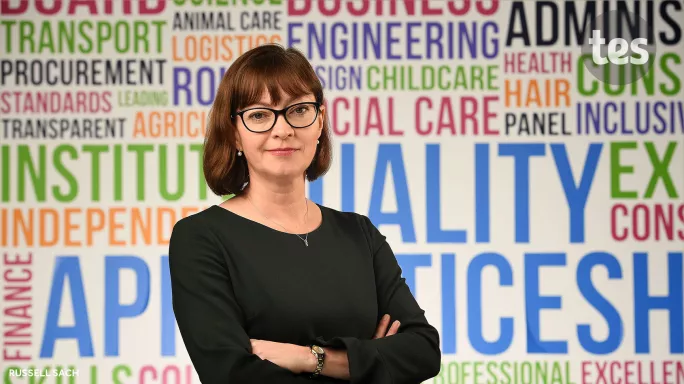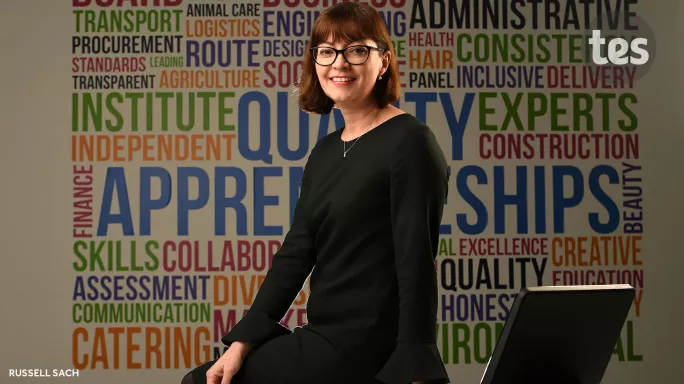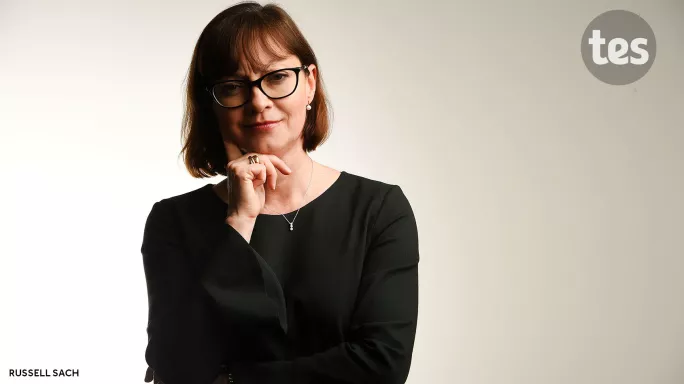- Home
- ‘In challenging times, you see what you’re capable of’
‘In challenging times, you see what you’re capable of’

Growing up on the Alexandra Road council estate in North London, the Institute for Apprenticeships and Technical Education's (IfATE) chief executive Jennifer Coupland understood perfectly the power that education can have in changing lives: it was a key lesson her parents drummed into her and her two sisters throughout their childhood.
Coupland’s parents came to London from Ireland in the 1950s, and neither of them had any formal education. Her dad left school at 14, and her mum didn’t go to school much after the age of 11. But they were determined that things would be different for their daughters.
“I was very lucky in that both of them really, really believed in the power of education to change lives, so although they hadn't had any sort of decent formal education themselves, they wanted me to get the best out of the education system – so they encouraged me and my two sisters to work hard in school,” she says.
“My dad used to have this stock phrase which was: if you get your education, then you can talk to people, because I think neither my mum nor my dad felt confident talking with people in authority. They relied on my sisters and I to do the talking.”
It’s that thread of social justice, that desire to facilitate education to be transformational, that Coupland says motivates her in her current role at IfATE.
News: Young people to get 'opportunity guarantee', says Johnson
More: 'Training providers going bust a real concern'
Background: New chief executive for IfATE revealed
'Accidentally' falling into the civil service
Coupland had a traditional education – she went to Hampstead Comprehensive in Cricklewood, a “genuinely comprehensive” school, she says, where she was “lucky enough to be quite bright”, before going on to the University of Leeds to study English.
She left university as the country was hitting a recession and, keen to get a job, she “accidentally fell into the civil service”. She went to a Jobcentre to sign on for benefits, and there she met a man called Brendan Gough. While taking her claim, he saw that she had an English degree, and asked her who her favourite poet was.
“I was sitting there thinking, 'What on earth is going on?' but he then started quoting Gerard Manley Hopkins and we had this lovely conversation about poetry. And then he said, 'Would you fancy a job here?' I didn't feel I could say no,” she laughs.
Coupland took a temporary job at the Jobcentre, before applying for a permanent role in the employment service. Within a few years, she was running the benefits section, and from there she moved into a policy role at the Department for Employment, working on the Jobseeker’s Allowance policy. The employment department and the education department merged shortly after and Coupland spotted an opportunity.
“I thought, 'This is an opportunity to go and work on something much more progressive and positive'. And so I moved across into the education space and have been here ever since,” she says.
As Coupland was moving into education, the New Labour government was moving into power, and her first job was working on the Labour education bill that abolished grant-maintained schools and introduced tuition fees.

“It was all about education, education, education. If you're a civil servant, one of the things that you want to do is to work on legislation at some point in your career – it's quite good fun working in Parliament and seeing how the system operates,” she says.
“It was a very demanding year, it was quite intense work, working with Parliament and ministers and lots of very late nights and early starts, but very energising and busy.”
She also worked on local authority intervention, before getting her first real taste of the world of further education, working on the policy that raised the participation age and focused on getting young people not in education, employment and training (NEET) into productive education training.
Having caught the post-16 bug, Coupland then stepped up to run the joint apprenticeships unit, which sat in both the education and business departments in 2012.
“I was pulled in two different directions and I used to try to get the best of both departments; often I’d end up getting the worst of both, two sets of governance and two lots of reporting lines. But it was a really exciting time because the job was about implementing the findings of the Richard review of apprenticeships,” she says.
“His review was seminal in that it was the thing that set this whole reform programme off, so putting employers in the driving seat of standards and funding for apprenticeships and creating an end-point assessment regime that we have now in place. It was a really exciting period of time and working directly with employers to test their appetite for designing apprenticeships through the Trailblazer process was just really great fun.”
The crisis that's 'stuck in her head'
Coupland spent three years running the unit before an opportunity arose to cover the maternity leave of the chief executive of the Standards and Testing Agency in February 2016. It was an “interesting and challenging” time, she says. The government had just introduced the new suite of Sats for Year 2 and Year 6 children – they were controversial at the time and proved to be one of the biggest challenges of her career. In March 2016, it was discovered that a spelling test had been published on the Standards and Testing Agency website in December 2015.
“They weren’t particularly popular reforms. And of course ministers immediately want to know the implications for that test series, whether it's compromised or not.
"We took the decision pretty quickly that we would just cancel the spelling test for everybody because I think we'd have 19,000 views on the page. You can see how it's stuck in my head,” she says.
Coupland was just a couple of weeks into the job and she had to conduct an inquiry into how the mistake had happened and how similar things could be prevented in the future.
“It was definitely one of the biggest challenges of my career. I've said to friends, it's always the sort of high watermark of misery. But it's amazing that when you find yourself in those sort of challenging situations you see what you're capable of, and how high your levels of resilience are,” she says.
“It was difficult at the start, and it just carried on being really, really challenging for quite a long stint of time. [At] the end of that, your confidence in your own leadership ability and how you manage to deal with stuff is enormously improved.”

Having successfully steered the agency through that troubling time, Coupland moved back into the post-16 sector, and got promoted to the role of director of professional technical education within the Department for Education. Within that role, she was responsible for the development of T levels. It was “another challenging period”, she says, but a good example of how ministers and the civil service could work well together. She gave “fair and frank” advice to then education secretary Damian Hinds on the feasibility of the timetable for T levels, and says she’s “very pleased” that issues were resolved.
After some internal reorganisation, Coupland’s job moved across to the Education and Skills Funding Agency (ESFA). She stayed there for three years, before the opportunity to move to IfATE as the chief executive arose.
“I felt having worked on apprenticeship policy and reform, and then doing technical education before, I thought I was uniquely qualified for the job of chief executive of the Institute, and so when I pitched it and got it, I was delighted,” she says.
Leading through the coronavirus pandemic
In November 2020, Coupland will have been in the job for a year. And what a year it will have been. Pre-Covid-19, her policy priorities for the institute were around the consultation on funding bands and bringing quality and assurance to end-point assessments. The institute was focused on being employer-centric, more efficient and more collaborative.
Today, those priorities aren’t too dissimilar. Funding remains a key priority, as does ensuring end-point assessments – whether they happen remotely or onsite – are of great quality.
T levels have come to the forefront; keeping them "on track" to be delivered in September amid the chaos of the coronavirus is something that Coupland says the institute has been working very hard on.
“These are really high-quality qualifications and you'll get an industry placement as part of the course which sets them apart from what's already being offered out there. I think it would be a real shame if they weren't offered to students who are interested in taking them in September 2020.
“I know that the department is working really closely with providers. A very small number have said that they want to delay for a year, but the vast majority of them have put in huge amounts of work and I'm really really keen to get going, teaching in September.”
Working on the "apprenticeship guarantee" – or "opportunity guarantee" as prime minister Boris Johnson labelled it this week – has been another unexpected focus for the institute. Coupland says that she was delighted when she heard Johnson talk about an apprenticeship guarantee.
“You know that, if you work in government, the prime minister taking an interest is always going to be a good thing for your policy area because we don't get much higher levels of interest than the PM. There are some really significant challenges facing the programme now…At this point in the pandemic, [we are] trying to get back to a sort of transition period and into some form of normality,” she says.
“We've been working really closely with DfE on a recovery package, thinking: how do we ensure that employees are feeling really confident about offering new apprenticeship opportunities and starting to recruit apprentices again? How do we ensure that, where apprentices have been furloughed or have had a break, they are supported to complete their apprenticeships? Hopefully we'll be seeing something from the government in the next few weeks.”

Leading a high-profile organisation through a crisis is no easy feat – but it's a challenge that Coupland has overcome before.
“I’ve been leading the organisation for eight months and nobody predicted a global pandemic. Obviously it has been a really big leadership challenge for me. We’ve had to adjust and adapt in the light of the circumstances that we face ourselves,” she says.
“Pre-Covid, we were facing some pretty big challenges: low productivity, Brexit, new immigration policies, local and regional inequalities. So now, we're overlaying that with a global pandemic, so I think the big question for the skills system is: how do we come out of that better and stronger? That’s going to be our focus for the next 12 months.”
And as Coupland says, it’s when you’re in those challenging situations that you truly realise what you’re capable of. It seems that can definitely be said of Coupland – and perhaps as we begin to move out of this pandemic, the further education sector, too.
Keep reading for just £1 per month
You've reached your limit of free articles this month. Subscribe for £1 per month for three months and get:
- Unlimited access to all Tes magazine content
- Exclusive subscriber-only stories
- Award-winning email newsletters



